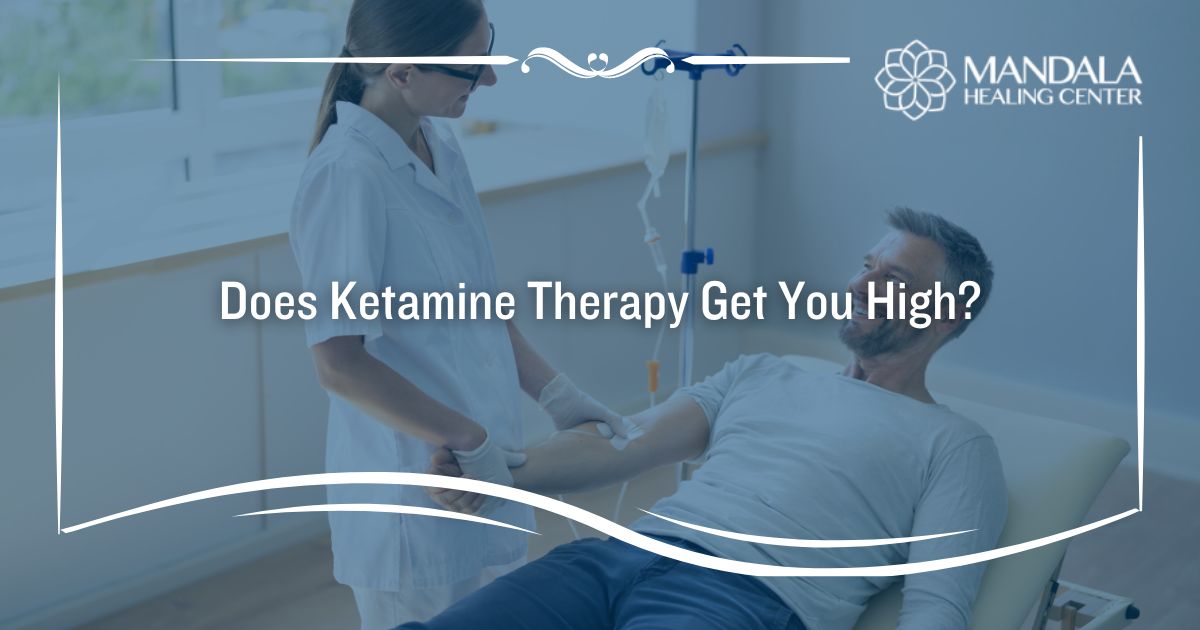Ketamine is a dissociative anesthetic drug that can produce hallucinogenic effects when abused.[1] It was originally used on animals for its anesthetic properties, however, it has been approved for medicinal use in humans. It is important to note that many people abuse this drug recreationally to experience a euphoric and out-of-body high.
While ketamine can be abused recreationally, it is also used for the treatment of various mental health conditions. When used in therapy, ketamine is given by a licensed mental health provider in smaller doses than when it is abused recreationally. Ketamine therapy is administered in a controlled manner to ensure that the individual receiving treatment is not abusing the substance, but still gaining therapeutic effects.
What Does Ketamine Therapy Treat?
Ketamine therapy is a treatment approach that uses low doses of the substance to address various mental health conditions. This type of treatment is offered to individuals who have tried other methods of treatment to address their mental health concerns with little to no success.
Ketamine therapy is used to treat the following conditions:
- Treatment-resistant depression
- Suicidal ideation
- Post-traumatic stress disorder
- Severe anxiety disorders
- Severe bipolar disorder
In some cases, ketamine therapy has been proven effective for treating substance use disorders.[2] However, people seeking addiction treatment should proceed with caution before attempting ketamine therapy because the substance can be addictive.
How Does Ketamine Therapy Work?
Ketamine therapy is most often used to treat patients with depression who have experienced little to no improvement from other types of treatment. For example, if you struggle with depression and have tried various antidepressant medications with no success, you might be a candidate for ketamine therapy.
Ketamine therapy is intended as a fast-acting depression medication that can alleviate symptoms in a matter of days. Additionally, studies have shown that participants in ketamine therapy experienced significant improvements in depression, anxiety, and the severity of mental illness in as little as one hour after infusions were completed.[3]
When you receive ketamine therapy, you will commute to a doctor’s office to get an IV infusion. Ketamine works to improve mental health symptoms by blocking the activity of the N-methyl-D-aspartate (NMDA) receptor, which is responsible for the regulation of mood and cognition.[3] As a result, people receiving ketamine therapy experience rapid improvements in their symptoms.
Does Ketamine Therapy Get You High?
Ketamine is a controlled substance that is often abused recreationally, so you might be wondering if ketamine therapy causes a high. While patients may experience some side effects during the treatment, only small doses of the drug are used. This means that patients will not experience the high associated with ketamine abuse.
During ketamine therapy, you will be placed in a comfortable chair and hooked up to an IV that provides a slow ketamine infusion. Typically, it takes 40 minutes for the infusions to be completed and the entire session lasts a maximum of 2 hours.
The common effects people experience during ketamine therapy include:
- Mental and physical relaxation
- Feeling light or faint
- Feelings of warmth
- Disconnection from your thoughts or body
- Slight changes in sensory perception
- Enhanced creativity or insight
- Distance from symptoms of anxiety or depression
Who Should Avoid Receiving Ketamine Therapy?
While ketamine therapy can be beneficial for many individuals suffering from mental health conditions like depression, it is not intended for everyone. Some individuals could experience negative effects as a result of ketamine therapy.
The following individuals should avoid using ketamine therapy:[4]
- People with a history of psychosis or schizophrenia
- Individuals with a history of substance use disorder
- Teenagers, as there is little research on the effects of ketamine on adolescent brains
- People who are pregnant or breastfeeding
- Older adults experiencing the symptoms of dementia
If you have ever struggled with a substance use disorder, it is best to avoid ketamine treatment unless you have been assessed for risk and a doctor has determined this type of therapy is beneficial. This is because ketamine therapy can cause feelings of euphoria, which may trigger your substance use disorder. While ketamine therapy is regulated by a doctor, this could trigger you to relapse and seek the drug on the street.
Find Help for Ketamine Abuse and Addiction
If you or a loved one abuse ketamine recreationally, you could be struggling with an addiction. Ketamine addiction can be difficult to overcome and puts you at risk of life-threatening situations like overdoses. As a result, you should always seek help from a professional drug rehab program.
To learn more about our ketamine addiction treatment program, contact Mandala Healing Center today.
References:
- The Drug Enforcement Administration (DEA): Ketamine, Retrieved September 2023 From https://www.dea.gov/factsheets/ketamine
- The National Library of Medicine (NLM): Efficacy of Ketamine in the Treatment of Substance Use Disorders: A Systematic Review, Retrieved September 2023 From https://www.ncbi.nlm.nih.gov/pmc/articles/PMC6094990/
- The National Library of Medicine (NLM): Efficacy of ketamine therapy, Retrieved September 2023 From https://www.ncbi.nlm.nih.gov/pmc/articles/PMC6767816/
- Harvard Medical School: Ketamine for treatment-resistant depression: When and where is it safe, Retrieved September 2023 From https://www.health.harvard.edu/blog/ketamine-for-treatment-resistant-depression-when-and-where-is-it-safe-202208092797












